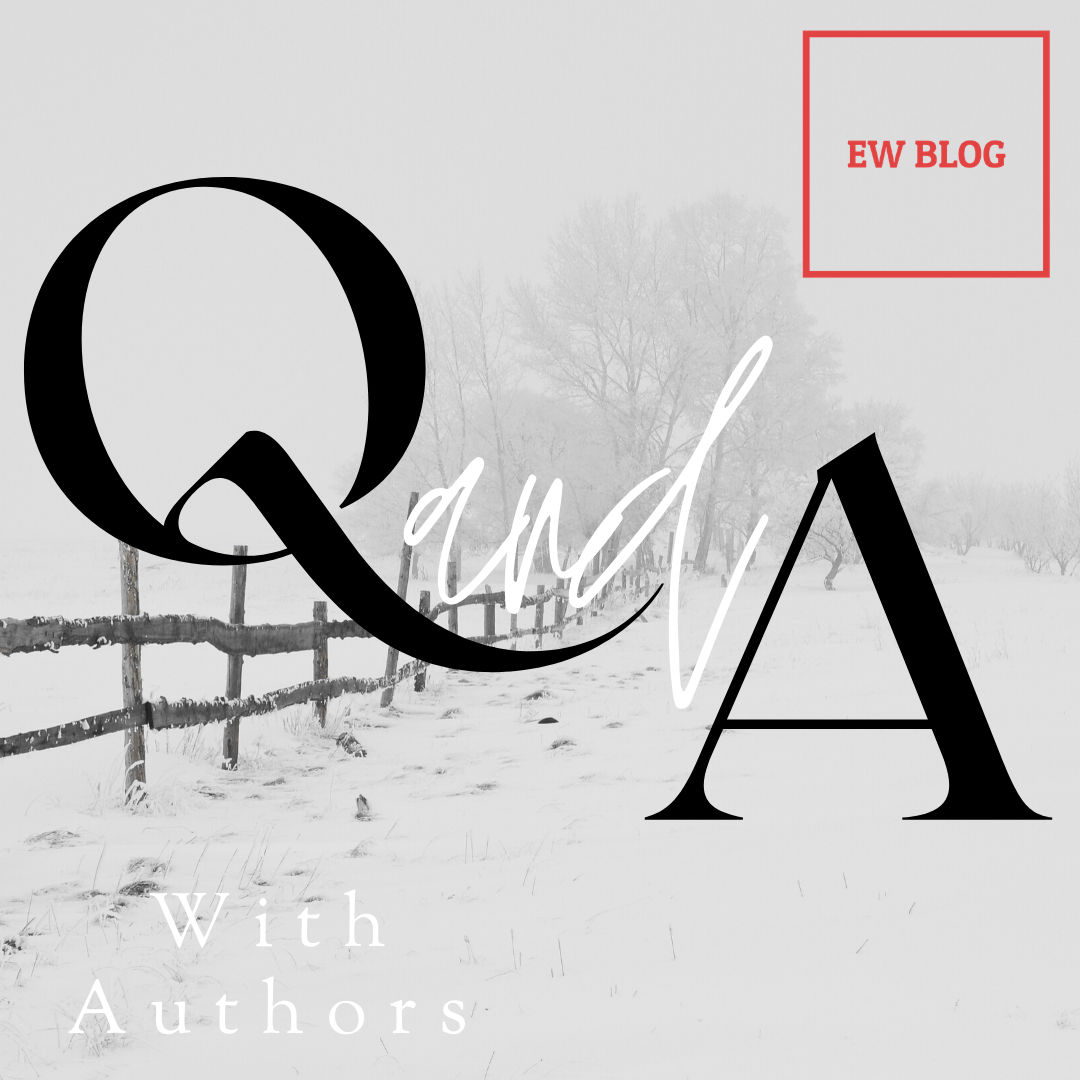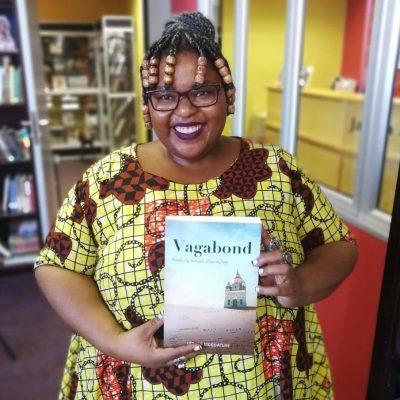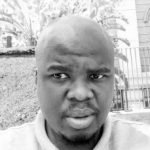

Q&A with Lerato Mogoatlhe
Author of Vagabond-Wandering Through Africa on Faith

by Ezekiel Kekana
Lerato Mogoatlhe is a content strategist, writer, professional traveller. She released her travel memoir titled Vagabond-Wandering Through Africa on Faith published by BlackBird Books in 2019. In this exclusive Q&A with EW Blog editor, Madam Afrika touches on her travelling experiences in the African continent, shares her views on the afrophobic attitude of South Africans towards their fellow Africans and why she loves this continent.
Photo credit: Lerato Mogoatlhe

Question: You were an entertainment journalist travelling across the world and the continent, what made you finally put a book together about your travelling experiences in the continent of Africa?

Answer:
I was an entertainment journalist for a very short while and have not been one since 2008 (THANK GOD. What a thankless, joyless, and exhausting life of zooming from event to event). I was always going to write a book, it just ended up taking a bit longer than I expected it would. Toni Morrison said write the book you want to read. I wanted to read a travel memoir that’s set in Africa and delivers more than adventure and ticking off a bucket list. I wanted to write Africa for what it is, you know my home. So, an experience that is intimate, involves all the senses and brings along the heart and soul.

Question: As a journalist, you spend too much time writing stories about other people and events, how did you find the process of writing about yourself in your debut book?

Answer:
I used to have backpage column in the City Press, and often referenced my life, including sex life so writing about my life was easy. What I did find incredibly hard was revealing my lowest moments and vulnerabilities. Talking about the incident in Abidjan when my fling removed the condom was hard because I could not share the story without showing you my fears and maybe even how I relate to myself. Some people have said I need to be gentle on myself, for example. After reading that part, my now fiancée asked if I didn’t want to step back and engage with the incident for what it was, a violation. Yet it is such a pivotal moment in my life as well, and I wanted it to read as it played out in 2008. This is easy to talk about even though it was hard to write. The absolute worst for me was writing about Rwanda because I had to mention everything: my internal struggles, my shame, my fears, my demons, my addiction. It felt like opening a can of worms, and it remains a very difficult space for me to be in, mentally and otherwise.

Question: Your debut travel memoir, Vagabond- Wandering Through Africa on Faith, why did you decide to go with this title?

Answer:
A vagabond is someone who wanders from place to place without a job, home or any clear sense of direction. My journeys did not make sense to some people. My manager at the job I had when I resigned dead ass asked: why don’t you go to Hillbrow ?( it was not a joke), some people murmured about focusing on a career, and so on but I knew what I was doing. I was rewriting African narratives. I was not being another African journalist complaining about how Western media portrays Africa without doing the damn work of writing Africa from experience. I had a plan: to promote destination Africa, to celebrate our arts and culture and heritage. To experience the best we have to offer. I wanted to reclaim Vagabond as a word that carries my power and purpose. It gave me an adventure of a lifetime. I was judged/mocked but look at what I did by being a Vagabond! Wandering through Africa on faith comes from my publisher because I didn’t have lots of money and bottomless savings accounts. I’d often run out of money but I was always confident that I would have food, a roof over my head and sometimes even a ticket out of town without a rand to my name because this much I have always known: I am home in Africa. I will be taken care of.

Question: Writing through your own experience and especially in the continent of Africa can be hectic, take us through the process of writing this book?

Answer:
I think the word for the journey I went on while writing the books is intense. I wanted to strike a balance between writing in the voice of the person I was while embarking on the journeys, including emotions. I also wanted to write with the benefit of hindsight and introspection so there were moments when I did not want to open my laptop or notebooks, when I did not want to open doors that I wanted to keep closed. I did not have a life at all while writing Vagabond, and my journeys in Egypt and Sudan were more of working trips. I was slogging on my laptop from different locations. I also battled a lot with the dynamics of life on the continent…a country is at peace today, and blowing up tomorrow, reconciling the next day and repeating the process several times over through the years. Take Mali. It was perfectly peaceful when I travelled there in 2008 and when I lived there in 2009. This was not the case when I was writing Vagabond. So, how to be true to my experiences without seeming oblivious to the present reality? How to not avoid the sad truth of our poverty and arrested development without seeing them everywhere or centering them in my story-telling? I’m led by emotions and spirit more than anything else, so I decided to be authentic to all the different parts of my journeys (the internal and external).

Question: What message(s) were you trying to convey about the African continent with your own personal experience to fellow Africans and the world?

Answer:
To Africans: travel your land, consume your art and culture, celebrate your icons, own your heritage and be unapologetically loud and proud of it. Seek the history they still refuse to teach us in schools and that they still don’t show us in the mainstream media. But you have to do this for yourself. You have to ask yourself why it’s more important for you to know Paris than, say Cairo or why your consumption of African art and culture is limited to your country’s pop culture. This continent is home. It’s complicated and complex but damned, it is home and a great one at that.
To the world, and parts of the diaspora that perpetuate stereotypes or come here to the dynamics of their dysfunctional Western society: cut out that bullshit this very instant.

Question: The African continent continues to be the most poverty-stricken continent in the world and has been labelled as a “dark continent”, from your travelling experience across the five regions, what are the things you think we should be proud of as Africans?

Answer:
- Our humanity. We see people here. We hold each other with love and tenderness. We are the embodiment of love, patience, and grace. Africa is rich in every way. We, the people, are the greatest treasure.
- Our ancient history and heritage.
- Our natural beauty.
- Our art and culture, including creativity, music, food and fashion and our youth (passionate, driven, changemakers, innovators, social justice warriors.

Question: Many South Africans continue to see themselves as “better Africans” than the rest of their African counterparts and would rather travel for holidays in Europe than in our continent, do you think there has been enough literature that promotes the good which this continent has to offer?

Answer:
About better Africans: That’s such a great pity. There are no better African, only Africans.
About travels: People are free to do what they want to with their money but I advocate travelling Africa, especially for Black South Africans and for Muslim South Africans. Muslims need to experience the affirmation of public spaces that are inclusive. Travel to Tanzania, Sudan, North Africa, Senegal, Bamako and experience the sound of the call to prayer five times a day, experience dining in restaurants that have prayer rooms, experience public spaces that also cater to your identity.
Black South Africans: our heritage has been reduced to one aspect (clothing) and it gets one day to shine everywhere. Corporate South Africa has turned heritage into brand identity and campaigns, but I dare you to walk into a boardroom dressed like it’s Heritage Day on February 21 and see what happens. And it’s not only the big bad corporate spaces. A black man was kicked out of the Gautrain for being dressed in his traditional garb (on a day that was not Heritage Day). While we fight systems that have rendered blackness invisible and unworthy except in spaces that are exclusively black, if you can travel then do yourself the honour of experiencing the healing and affirming energy of being black in a society that’s tailor-made to accommodate, elevate and celebrate witness at the expense of blackness

Question: Afrophobia continues to be regular feature in South Africa, where many Africans continue to be easy targets of South Africans’ socioeconomic frustrations, how does that make you feel when your fellow citizens abuse the people who always show you love and give you warm welcomes in their homes in your travelling expeditions across the continent?

Answer:
It makes me angry (at the people) sad (for the people), disillusioned (with leadership that’s mostly interested in playing politics with afrophobia

Question: In the chapter Hearing Voices, you touch on your emotional trip to the Rwandan museum which houses the victims of the 1994 genocide, 26 years later, do you think the Rwandans have built a sense of national unity and moved on from that tragedy

Answer:
Can I skip this one? I think this a question best answered through a lived experience that encompasses so much more than the observations of a passer-by.

Question: From North, South, Central, East and to the West of Africa, which three countries in the continent will forever be your favourite destinations?

Answer:
Mali: Other than the ancient history and heritage, and the way they infuse themselves into every aspect of life today, Mali is a favourite because it’s one of the most musical
places in the world and because Malian love differently. People hold a stranger in their heart and love unconditionally. This is the kind of life that changes everything: your understanding of yourself, how you relate to yourself and others, how you express your humanity. After encountering this love, I became more giving, more generous, kinder, and started seeing people instead of seeing through them. Everything that I love about myself was either born in Mali or nurtured in Mali.
Sudan: Here, love comes up again. Here, it is the kindness of strangers and the many little ways it manifests that come together to make Sudan unforgettable. My favourite example of this: While in Port Sudan, I kept noticing large clay jugs everywhere (streets, outside people’s yard and shops, in people’s yards. I started noticing them everywhere I went (Dongola, Khartoum etc). People fill them with drinking water for anyone to drink when they are thirsty. Sudan is in the desert, and it gets sizzling hot. If you need a drink of water, you have it wherever you are, and you don’t even have to ask for it.
Kenya, Egypt, Mozambique are perfect destinations.

Question: If you had to travel with three South African authors to Senegal for a live music concert featuring the great Salif Keita, who would that be and why them?

Answer:
- Bongani Madondo because we’ll talk about music non-stop and it will be a rich and layered conversation that goes far deeper than music.
- Zukiswa Wanner because she’s F.U.N
- Niq Mhlongo because he has been around Africa, and I want to experience being on the road with him.

Question: Since you have recorded your African travelling experiences, is there a plan to do a book on another continent?

Answer:
I’m always dreaming about big travel adventures, so you never know. I would love to write more books, better if they are about Africa or connected to Africa.

Question:
Which book are you currently reading?

Answer:
The Fishermen by Chogozie Obioma
Book Review
Share this:
- Click to share on X (Opens in new window) X
- Click to share on Facebook (Opens in new window) Facebook
- Click to print (Opens in new window) Print
- Click to share on LinkedIn (Opens in new window) LinkedIn
- Click to share on Reddit (Opens in new window) Reddit
- Click to share on Tumblr (Opens in new window) Tumblr
- Click to share on Pinterest (Opens in new window) Pinterest
- Click to share on Telegram (Opens in new window) Telegram
- Click to share on WhatsApp (Opens in new window) WhatsApp
- Click to email a link to a friend (Opens in new window) Email

